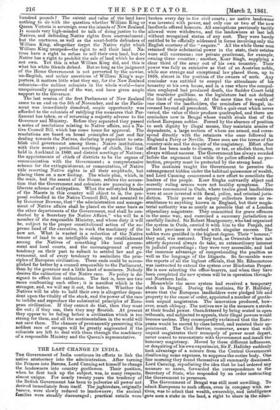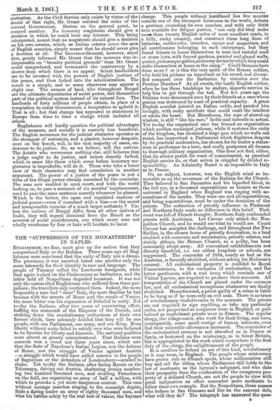THE LAST CHANGE IN INDIA.
Tux Government of India continues its efforts to link the native aristocracy into the administration. After turning the Princes into barons, Lord Canning set himself to change the landowners into country gentlemen. Their position, when be first took up the subject, was, in many respects, almost unique. For nearly twenty years the tendency of the British Government has been to pulverize all power not derived immediately from itself. The jaghiredars, originally barons, were slowly reduced to landowners ; the ancient families were steadily discouraged ; practical entails were broken every day in the civil courts ; no native landowner was invested with power, and only one or two of the new landlords offered honours. All exemptions previously tacitly allowed were withdrawn, and the landowners at last left without recognized status of any sort. They were barely entitled to be officially addressed in forms involving only the English courtesy of the "esquire." All the while these men retained their substantial power in the state, their estates were still enormous; one private gentleman, for example, owning three counties ; another, Koer Singh, supplying a clear third of the army out of his own tenantry. Their power was fully as extensive as that of an Austrian nobler while one strange and exceptional law placed them, up to 1858, almost in the position of the owners of serfs. Any zemindar was entitled to compel the attendance of his tenantry at his own house, and in a case where the compul- sion employed had produced death, the Sudder Court held the murderer guiltless, as the legislature had not defined the limit of compulsion. At the same time the wealth of one class of the landholders, the zemindars of Bengal, in- creased beyond all precedent. With a quit-rent which never varied, the value of their produce quadrupled, and there are zemindars now in Bengal whose wealth rivals that of the richest European nobles. Forced by the absence of position to seek dignity by illegal means, they maintain armies of dependents, a large section of whom are armed, and corre- spond directly with the retainers who once followed in England a Percy or Neville. These men are the terror of the country-side and the despair of the magistracy. Effort after effort has been made to disarm, or tax, or abolish them, but always without success. The Government has always receded before the argument that while the police afforded no pro- tection, property must be protected by the strong hand. The mutinies taught the Government to perceive the estrangement bidden under the habitual quiescence of wealth, and Lord Canning commenced a new effort to conciliate the leaders of the people. Koer Singhs outwardly abject and secretly ruling armies were not healthy symptoms. The process commenced in Oude, where twelve great landholders were at once invested with fiscal, police, and criminal juris- diction. Their power as deputy collectors bears no re- semblance to anything known in England, but their magis- terial authority was as nearly as possible that of a London stipendiary magistrate. They committed for grave offences in the same way, and exercised a summary jurisdiction as carefully limited. Sir Robert Montgomery, who bad organized the system in Oude, carried it with him to the Punjab, and in both provinces it worked with singular success. The nobles were gratified in the highest degree. Their "honour," they said, was restored. They took, as Orientals when not utterly depraved always do take, an extraordinary interest in judicial proceedings ; they were very accessible, and had. the immense advantage of comprehending the position as well as the language of the litigants. So favourable were the reports of all the highest officials, that Mr. Edmonstone was instructed to extend the system over Hindostan Proper. He is now selecting the office-bearers, and when they have been completed the new system will be in operation through- out Northern India.
Meanwhile the same system had received a temporary check in Bengal. During the mutinies, Sir F. Halliday, aware that the European landholders were pledged life and property to the cause of order, appointed a number of gentle- men unpaid magistrates. The innovation produced, how- ever, much obloquy. The natives saw in the measure a stroke at their feudal power. Once.fettered by being seated in open tribunals, and subjected to appeals, their illegal powers would become useless. They consequently exclaimed that the Euro- peans would be moved by class hatred, and resisted their ap- pointment. The Civil Service, moreover, aware that with unpaid magistrates their monopoly of power must depart, never ceased to remonstrate with Government and insult the honorary magistracy. Moved by these different influences, or despairing of his own experiment, Sir F. Halliday suddenly took advantage of a minute from the Central Government disallowing some expenses, to suppress the entire body. One fine morning they found themselves all summarily dismissed. Lord Canning, repudiating the idea that he had ordered any measure so harsh, forwarded the correspondence to the Secretary of State, who responded by an order instructing the Government to persevere. The Government of Bengal was still most unwilling. To admit Europeans to such offices, even in company with na- tives, was to admit that wealth, ownership, and intelligence gave men a stake in the land, a right to share in the admi- nistration. As the Civil Service only exists by virtue of the denial of that right, Mr. Grant resisted the order of the central Government. Beaten on the general point, he essayed another. No honorary magistrate should give a decision in which he could have any interest. This being interpreted, meant that no magistrate should give a decision on his own estates, which, as Indian estates cover the area of English counties, simply meant that he should never give a decision at all. The Governor-General, however, stood firm, gently informed Mr. Grant that the measure was in- dispensable on " broader political _grounds" than Mr. Grant could comprehend, and terminated the controversy by a decree from which there is no appeal. Select landholders are to be invested with the Flowers of English justices of the peace, and thus linked into the administration. The result is a simple, and to some observers may appear a slight one. The owners of land, who throughout Bengal are the ultimate depositaries of social power, feel themselves wt of the political system instead of its natural foes. The landlords of forty millions of people obtain, in place of a temptation to resist Government, a temptation to uphold it. That is all ; but that change has appeared to statesmen in Europe from time to time a change which included all others.
Englishmen will hardly question the political advantages of the measure, and socially it is scarcely less beneficial. The English reverence for the judicial character operates as the strongest of restraints, and a planter, however despotic, once on the bench, will, in the vast majority of cases, en- deavour to do justice. So, as we believe, will the natives. The Asiatic who reverences nothing else, still believes that a judge ought to do justice, and unless directly bribed, which in cases like those which come before honorary ma- gistrates is improbable, will do it. Those who take a lower view of their character may find consolation in another argument. The power of a justice of the peace is not a tithe of the illegal power already exercised by the zemindar. The man now enabled in open court, and with the world looking on, to pass a sentence of six months' imprisonment, used to pass the same sentence secretly whenever he pleased. Which is the better, the open and regulated exercise of judicial power—even if exercised with a bias—or the secret and irresponsible exercise of a much larger'autherity ? Un- less the natives of Bengal differ from all other natives of India, they will regard dismissal from the Bench as the severest of social punishments, one which every: man not wholly overborne by fear or hate will hesitate to incur.































 Previous page
Previous page